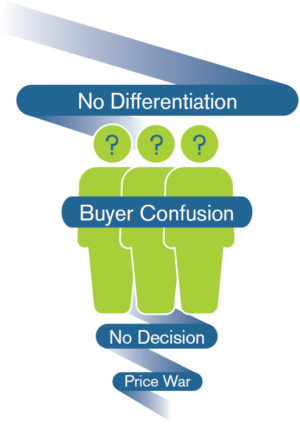What happens when your position doesn’t differentiate you from the competition? What affect does it have on marketing? And what about sales?

Lack of differentiation is one of several common, costly symptoms of poor positioning. It creates market confusion, which means your marketing isn’t noticed. It also causes longer sales cycles, a familiar problem for many B2B software and technology companies, or even worse – no decision or a price war.
Two other symptoms that plague B2B software companies across all markets will be topics of future blogs: lack alignment and no consensus about what the position should be, and lack of consistency – failure to use a position as the theme for all marketing communications including website content, social media, webinars, banner ads, etc.
You won’t find anyone in marketing, sales or management disputing the need and desire to differentiate. Everyone wants to do it, but for some hard-to-understand reason, differentiation is almost as elusive as drawing a winning lottery number.
Lack of differentiation has been a problem for at least 50 years
The problem with lack of differentiation in marketing was first identified by Ries and Trout when they published “Positioning: The Battle for Your Mind” in 1981:
“…too many companies embark on marketing and advertising as if the competitor’s position did not exist. They advertise their products in a vacuum and are disappointed when their messages fail to get through.”
Today, lack of differentiation is a problem in every major B2B software and technology market. For example, 13 Business Intelligence software companies position around the notion of “insight.”
What’s hard to understand is why companies apparently ignore competitors’ marketing, particularly websites where their position is obvious. You can quickly determine whether your position is unique by evaluating competitors’ positioning on their websites. If your position differentiates, you’ve found the ideal position assuming it also expresses a benefit the buyer considers important.
How to get buyers to notice and remember you
Buyers notice and remember a unique position that is executed in all marketing communications and during sales efforts. A differentiated position makes buyers want to buy because it highlights the difference, gap, or disruption the brain is seeking to justify making a decision.
According to “Neuromarketing,” the decision-making portion of the brain “responds favorably to clear, solid contrast. It is hard wired to pay attention to contrast which helps prospects make decisions more quickly and easily. Contrast is often needed to trigger our brain to make a decision.”
Just remember that without clear-cut choice, our brain enters into a state of confusion. The absence of contrast – especially when a prospect has difficulty understanding the differences between your product and others – will bring the prospect’s decision-making ability to a halt.
Many think differentiation is hard to achieve. It isn’t.
Here is a link to a page on my website that explains how to differentiate. The first step is pretty easy and obvious – pay attention to how your competitors are positioned. You’ll identify an unclaimed position that your target buyers are sure to notice….as long as they consider it important
